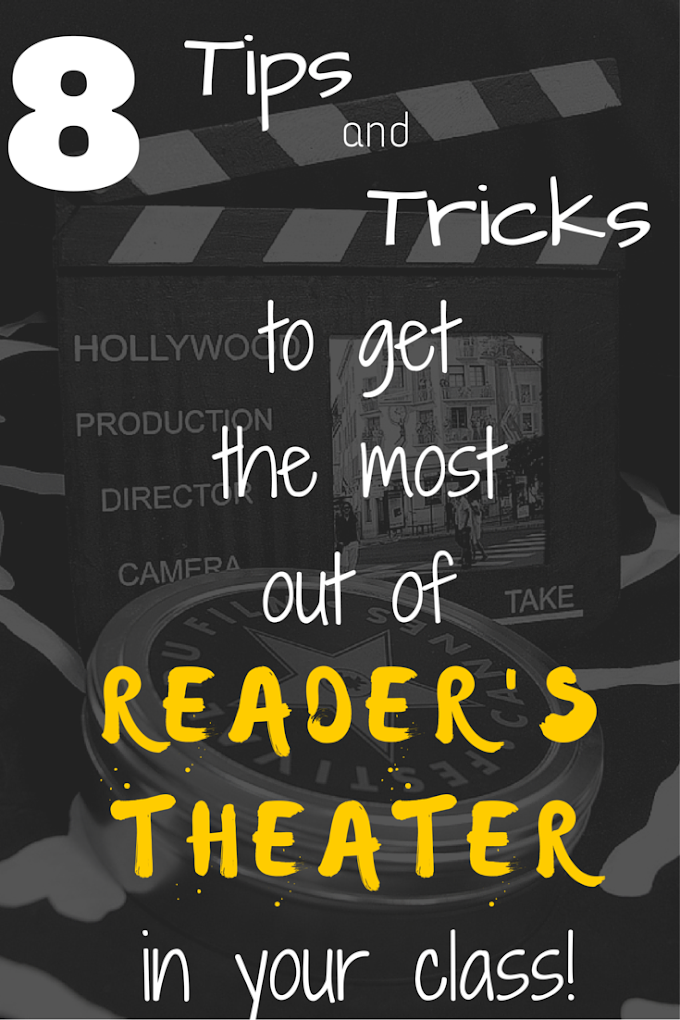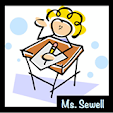
Do you have those moments in your class? The moments where you realize you've been talking way too long? When you see the blank stares looking back at you? When you know you need to switch gears, but aren't sure how?
Enter: Reader's Theater!
The beauty of reader's theater is it can get your class engaged in your content and improve their fluency and comprehension. It's like a three for one!
I've been lucky enough in my career to work with a reader's theater guru and drama consultant, Rosalind Flynn. Through an amazing professional devolopment partnership with the Kennedy Center called CETA (Changing Education through the Arts), Ms. Flynn shared her expertise with myself and other teachers at my school. Her focus was on writing content based scripts. (You can check out more about her work here: http://www.rosalindflynn.com/DocFlynn.html)
Genius, I thought! What a way to encourage content learning and improve reading skills at the same time.
My class began practicing scripts All.The.Time. Ok, not all the time, but we had enough to fill a book or two.
So what did I learn? Quite a lot. Here are my top 8 reader's theater tricks and tips to help you with implementation in your classroom.
1. Get your class begging to reread!
From the moment I introduce a script, I use theater terms to get kids excited. We're not reading a script again, we're having a "read-through." We're not starting over, we're "taking it from the top." I'm no longer their teacher, I'm their director. And we're not done until I yell, "CUT!" It's amazing how just this lingo gets them excited about rereading a script they've already read 30 times!
2. Highlighters are your friend!
I always, always, always have my students highlight their part. When the highlighters come out, they know class is getting serious. Once they've highlighted, they feel more ownership over the script. Something so small will make them less likely to lose it later. Those who highlight together, stay together.
3. Encourage community
The first time someone skips a line, and inevitably it will happen, you will see the future directors in your class come screaming forward.
"Pssssst. It's your turn!"
" (Insert name here), why aren't you reading your line?"
"Dramatic sigh!"
Nip that right in the bud. I make it clear from the beginning of our readings that I am the director. If someone forgets their line, I will be the one to fill it in.
I make my point by having students pretend to be in an audience watching our reader's theater. If someone forgot their line, and all of the sudden there's yelling or nudging going on, would they notice? Yes, of course! If someone forgot their line and the teacher fills in, would it look as silly? No.
If I notice I'm always filling in lines for a student, I pull them aside and discuss it, or give the line away to someone else. Sometimes a kid may volunteer and then feel in over their head. That's ok. Give them time to warm-up.
4. Don't encourage props
In one of the first scripts I worked on as a whole class, I allowed students to make props. Five months later, we were ready to perform. It was a huuuuuuge waste of time.
Instead, enhance the theatrical performance by allowing students to use gestures or sound effects. Those are much, much less time consuming. Each minute of your day is so valuable. Don't waste it making paper swords and hats.
5. Memorization not required
Inevitably during a practice, I'll have a student say they memorized their lines and don't need their script. Discourage this! Rereading works best when students actually follow along with the text. I tell them that I don't want them memorizing and they ALWAYS need their script because sometimes as a director, I'll make changes and they need to be ready. Maybe I'll give them another part. Maybe I'll change theirs. They always need to be watching their script. I'm a tough director. Welcome to Hollywood, kid.
6. Let your extroverts and introverts shine!
I was always pleasantly surprised when one of my students volunteered for a part. A script can be a security blanket. Finally they can participate without having to think about their own words. It's beautiful to see a shy student come a little bit out of their shell.
And if my shy student remains shy, that's ok too. Sometimes I talk with them and another student privately about sharing a line. They could have a theater buddy to perform the line with.
I try to find scripts with choral parts. Maybe they feel most comfortable participating that way.
And when they do speak, I always make a note to comment on it. This encouragement can make them stick with you while you rehearse. For them, at least initially, it's less about perfecting reading fluency and more about building confidence.
7. Give fluency tips
The beauty of reader's theater, whether you're reading one based on content or one for fun, is that fluency improves with each rereading as does comprehension. So I stop students throughout their read-throughs to give encouragement on how to read lines. You can use the basics, encouraging students to read lines louder, softer, faster, slower. You can also encourage inferring skills like, "If you were this person in this situation, how might you say the line?"
One great tip I've picked up along the way to have students speak loudly enough is to tell them to "hit me with their voice." I'll stand as far away as possible from them, and tell them to pretend their voice is an object. They need to throw it and hit me with it. Encourage them to be loud, especially if you decide to perform your script for others. Once in front of a crowd, immediately they'll go quiet.
8. Save time
Having trouble teaching about quadrilaterals? Are your lessons about the Revolutionary War bringing your class to tears? Save time in your content areas by finding or writing content based scripts. I've made several myself which you can check out HERE. Not only will students improve their reading comprehension and fluency, they'll understand the objectives you need to teach.
What teacher tips can you share? Leave a comment below. Then, exit, stage right.







1 Comments
This is fun for the kids. Another fun idea is to take book characters and have the students do monologues or dialogues from their point of view. I set this wonderful article to be pinned on several boards in the upcoming week. All my best.
ReplyDeletehttps://www.facebook.com/CatchMyProducts/